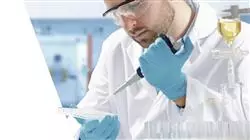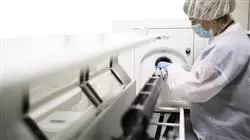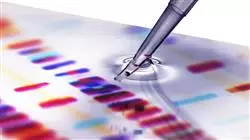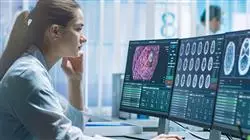University certificate
The world's largest faculty of physiotherapy”
Description
TECH has the best program on the educational market to update you on recognition and intervention techniques through biomedical images and you are only 1 click away from being able to access it”

The development of biomedical sciences and the application of Big Datastrategies for the analysis and processing of information have favored the evolution of imaging diagnosis. Today it is possible to obtain high resolution, clear and concise results, thanks to which professionals such as Physiotherapy can work in a more specific, safe and personalized way depending on the physical characteristics of the patient, as well as the specifications of your ailment: a contracture, a muscle tear, a bone displacement, an overload, etc.
Thanks to this, the effectiveness of the treatments increases, reducing recovery times and, therefore, guaranteeing a considerable and faster improvement in your quality of life. Based on this and the need on the part of these specialists to have a program that allows them to be up-to-date on developments in this field, TECH and its team of experts in Bioinformatics and Biomedical Engineering have developed this postgraduate diploma It is a 450-hour educational experience through which the graduate will be able to delve into scientific advances in relation to recognition and intervention techniques through biomedical images. You will also be able to update your knowledge on the massive processing of clinical data through the most innovative Big Data techniques. To conclude, there will be a brief but intensive review of the applications of Artificial Intelligence and the Internet of Things (IoT) to Telemedicine.
All this throughout 6 months of the best and most exhaustive educational experience, in which a multitude of additional material has been included so that the graduate can delve into the different sections of the agenda in a personalized way: research articles, complementary readings, dynamic summaries, news, self-knowledge exercises and clinical cases. It is, therefore, a unique opportunity to update and renew your clinical practice through a 100% online degree that is perfectly compatible with your work activity.
A unique educational opportunity to delve into the advantages and disadvantages of image-guided interventionism through a 100% online educational experience”
This postgraduate diploma in Biomedical Image Analysis and Big Data in E-Health contains the most complete and up-to-date scientific program on the market. The most important features include:
- The development of practical cases presented by experts in Biomedical Imaging and databases
- The graphic, schematic, and practical contents with which they are created, provide practical information on the disciplines that are essential for professional practice
- Practical exercises where the self-assessment process can be carried out to improve learning
- Its special emphasis on innovative methodologies
- Theoretical lessons, questions for the expert, debate forums on controversial topics, and individual reflection assignments
- Content that is accessible from any fixed or portable device with an Internet connection
The TECH team of experts has included hundreds of hours of diverse material in this program so that you can delve into the different sections of the agenda in a personalized way”
The program’s teaching staff includes professionals from the sector who contribute their work experience to this educational program, as well as renowned specialists from leading societies and prestigious universities.
Its multimedia content, developed with the latest educational technology, will provide the professional with situated and contextual learning, i.e., a simulated environment that will provide an immersive education designed to learn in real situations.
The design of this program focuses on Problem-Based Learning, by means of which the professional must try to solve different professional practice situations that are presented throughout the academic course. This will be done with the help of an innovative system of interactive videos made by renowned experts.
A perfect program to update you on the aspects to take into account in relation to radiation protection, both for you and for the patient"

You will be able to access the Virtual Campus from anywhere thanks to the compatibility of the platform with any device with an Internet connection, be it a tablet, PC or mobile"
Objectives
Physiotherapy specialists had been demanding for a long time the existence of a degree that would allow them to combine their professional activity with the course of a program through which they could update their knowledge in relation to the analysis of Biomedical Images. Based on this, and as a sign of the commitment of this university to the growth of all its graduates, TECH has developed a multidisciplinary and intensive program with which they will be able to update themselves on the latest in E-Healthin a guaranteed manner and through a comfortable and flexible 100% online format.

A program designed for you to reach even your most ambitious goals through the best theoretical, practical and additional material”
General Objectives
- Develop key concepts of medicine that serve as a vehicle to understand clinical medicine
- Determine the major diseases affecting the human body classified by apparatus or systems, structuring each module into a clear outline of pathophysiology, diagnosis, and treatment
- Determine how to obtain metrics and tools for healthcare management
- Understand the basics of basic and translational scientific methodology
- Examine the ethical and best practice principles governing the different types of research in health sciences
- Identify and generate the means of funding, assessing and disseminating scientific research
- Identify the real clinical applications of the various techniques
- Develop the key concepts of computational science and theory
- Determine the applications of computation and its implication in bioinformatics
- Provide the necessary resources to practically apply all the concepts in the modules
- Develop the fundamental concepts of databases
- Determine the importance of medical databases
- Delve into the most important techniques in research
- Identify the opportunities offered by the IoT in the field of e-Health
- Provide specialized knowledge of the technologies and methodologies used in the design, development and assessment of telemedicine systems
- Determine the different types and applications of telemedicine
- Delve into the most common ethical aspects and regulatory frameworks of telemedicine
- Analyze the use of medical devices
- Develop the key concepts of entrepreneurship and innovation in e-Health
- Determine what a business model is and the types that exist
- Collect e-Health success stories and mistakes to avoid
- Apply the knowledge gained to your own business idea
Specific Objectives
Module 1. Techniques, Recognition and Intervention using Biomedical Imaging
- Examine the fundamentals of medical imaging technologies
- Develop expertise in radiology, clinical applications and physical fundamentals
- Analyze ultrasound, clinical applications and physical fundamentals
- Delve into tomography, computed and emission tomography, clinical applications and physical fundamentals
- Determine how to manage magnetic resonance imaging, clinical applications and physical fundamentals
- Generate advanced knowledge of nuclear medicine, differences between PET and SPECT, clinical applications and physical fundamentals
- Discriminate noise in the image, reasons for it and image processing techniques to reduce it
- Present image segmentation technologies and explain their usefulness
- Gain a deeper understanding of the direct relationship between surgical interventions and imaging techniques
- Establish the possibilities offered by Artificial Intelligence in the recognition of patterns in medical images, thus delving into innovation in the sector
Module 2. Big Data in Medicine: Massive Medical Data Processing
- Develop specialized knowledge on mass procurement techniques of data in Biomedicine
- Analyze the importance of data preprocessing in Big Data
- Determine the differences between the data derived from different massive data collection techniques, as well as their special characteristics in terms of pre-processing and handling
- Provide ways of interpreting results from massive data analysis
- Examine the applications and future trends in the field of Big Data in biomedical research and public health
Module 3. Applications of Artificial Intelligence and the Internet of Things (IoT) in Telemedicine
- Propose communication protocols in different scenarios in the healthcare field
- Analyze IoT communication, as well as its application areas in e-Health
- Substantiate the complexity of artificial intelligence models in its use in healthcare
- Identify the optimization brought by parallelization in GPU-accelerated applications and its use in healthcare
- Present all the Cloud technologies available to implement e-Health and the IoT products, both in computing and communication

If mastering the latest trends related to massive data processing is one of your objectives, this postgraduate diploma will give you the keys to achieve it”
Postgraduate Diploma in Biomedical Image Analysis and Big Data in E-Health.
Biomedical image analysis and Big Data in E-Health are two technologies that are used together to improve medical care and healthcare.
Biomedical image analysis refers to the processing and analysis of medical images, such as X-rays, CT scans, MRIs, ultrasounds, among others. The technology used in biomedical image analysis includes image processing algorithms, which make it possible to analyze and extract information from medical images for more accurate and detailed diagnosis.
On the other hand, Big Data in E-Health refers to the ability to collect large amounts of patient data and used for decision making and analysis. Big Data technology enables the collection and analysis of large amounts of data from a variety of sources, such as electronic medical records, patient sensor data, genomic databases, among others.
Applications of technologies in E-Health.
Early disease detection: Biomedical image analysis and Big Data can help in the early detection of diseases such as cancer by enabling the identification of patterns in large data sets.
Treatment selection: By analyzing data on previous treatments, clinicians can select the best available treatment for the patient.
Diagnosis customization: With the help of biomedical image analysis, a precise personalized diagnosis can be created for each patient, enabling more effective treatment.
Medical research: Big Data technology can be used in medical research to identify patterns and trends, which can lead to new discoveries and treatments.
Biomedical image analysis and Big Data are complementary technologies that can improve the healthcare process, enabling early disease detection, treatment selection, diagnostic personalization and advances in medical research.







